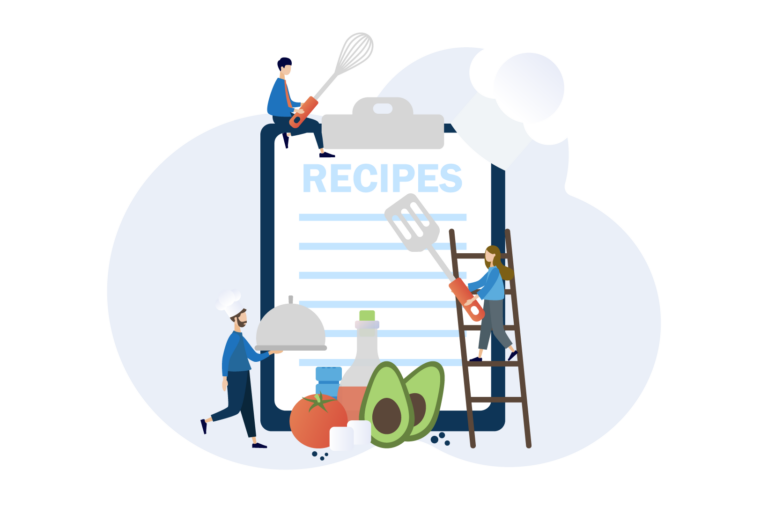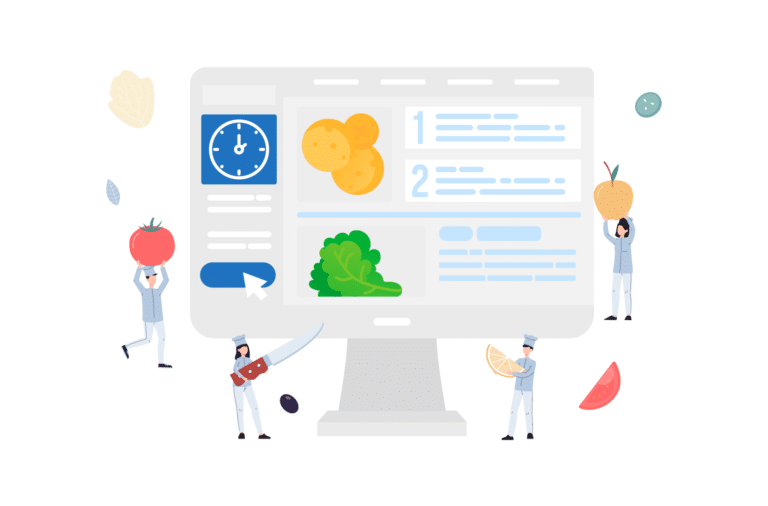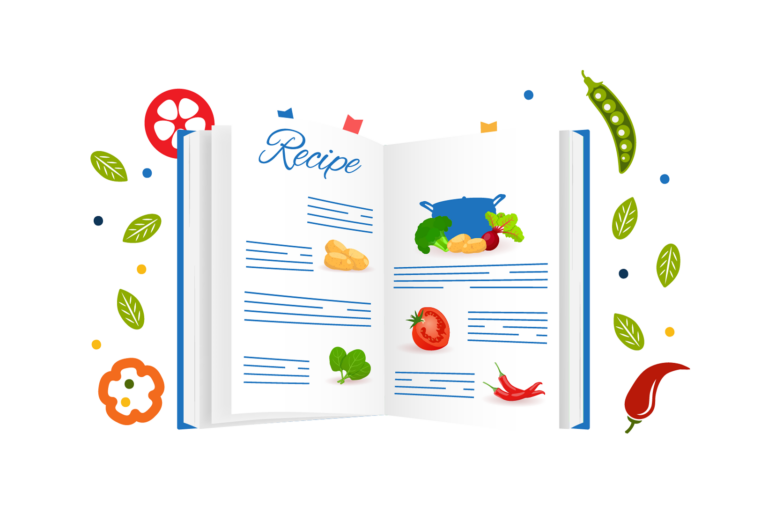Ever thought about the people behind the recipes you love? Recipe developers are the creative minds who transform ideas into the dishes you see on popular cooking websites, in magazines, and even in restaurants. While it might seem like you need years of chef experience to break into this field, that’s not always the case. If you’re passionate about food, constantly experimenting with new ingredients, and ready to put in the work, you can carve out a space for yourself in recipe development.
In this article, we’ll look at what it takes to turn your love for cooking into a rewarding career, and how you can get started even if you don’t have a formal culinary background!
The essential skills and knowledge for recipe development
Becoming a successful recipe developer takes more than just a love for cooking – it’s about mastering several skills that will help you stand out. Here are the four essential areas to focus on:
1. Culinary experience
Recipe developers often have a deep understanding of advanced culinary techniques, like pairing flavors and knowing the chemistry behind different cooking methods. While formal culinary training or working in a professional kitchen can help, it’s not a strict requirement. Many of these skills can be picked up through self-teaching, online courses, or by getting stuck into culinary books. At the end of the day, the main thing is to experiment in your own kitchen and learn through practice.
2. Recipe writing skills
Being able to cook up delicious dishes is one thing, but writing them down in a way that others can easily follow? That’s a different story! While cooking might come naturally, recipe writing is a skill that takes time. A good recipe should be clear, concise, and flexible enough for different formats – whether it’s for a blog, a magazine, or a cookbook. The trick here is making sure that anyone, from beginners to professional cooks, can recreate your dish without any confusion.
Developing your own writing style is just as important. Think about how you approach cooking – do you experiment with flavors, rely on instinct, or follow strict measurements? Bringing that personal flair into your recipes helps them stand out. Starting a food blog is a great way to practice and find your voice. Plus, it gives you hands-on experience in writing recipes that can be scaled for any audience while developing your unique tone!
3. Food photography
These days, with social media turning everyone into a food photographer, having a great recipe isn’t enough – it has to look just as good as it tastes. Many recipe developers are expected to snap their own photos, creating drool-worthy shots that make people stop scrolling. Learning the basics of food styling and photography can really take your recipes to the next level and help them stand out.
And here’s the bonus: recipe developers who can provide beautiful photos along with their creations often earn more. Clients love getting a complete package, and a well-styled dish can make all the difference in catching someone’s eye. So, even if you’re new to photography, getting to know a few tricks will help show off your food in its best light – literally!
4. Recipe development tools
Using the right tools can take a lot of the hassle out of recipe development. From improving your workflow to making sure your recipes look great online, having the right software makes all the difference. For food bloggers, WP Recipe Maker is an excellent tool for showing off and managing your recipes on WordPress.

With its easy-to-use template editor, you can design recipe cards that fit your brand, while built-in SEO features help your recipes get noticed. Tools like serving adjustments and unit conversions (that come with the PRO version) also make your recipes accessible to a wider audience, no matter where they’re cooking from!
Building your recipe portfolio: Tips and techniques
If you’re serious about becoming a recipe developer, you really need a great portfolio. It’s your way of showing off what you can do – your creativity, your originality, and your ability to create recipes that people will actually want to try. Think of it as your personal menu, full of unique dishes that reflect your style and the kind of flavors and techniques that set you apart!
To build an impressive portfolio, you’ll want to focus on recipe testing. It’s one thing for your recipes to work for you, but can others follow them and get the same result? That’s where testing comes in. Have friends or colleagues test your recipes to make sure the instructions are clear and easy to follow and that the final dish turns out as expected. If something doesn’t work, don’t hesitate to adjust your methods or ingredient quantities until everything is just right.
Another important tip is to standardize your recipes. Whether you’re using imperial or metric measurements, stick to one system for consistency. Be sure to include prep time, cook time, and servings, and add any extra details like an equipment list if necessary. This makes your portfolio look professional and means anyone following your recipes knows exactly what they’ll need to get started.

When it comes to presenting your portfolio, you’re going to want to be organized. A well-organized portfolio (whether it’s a printed book or an online blog) makes a big difference. Think about setting up a professional website or food blog where you can display your work. Not only does this give potential clients an easy way to view your recipes, but it also helps you build your brand as a recipe developer. Plus, it’s a great way to keep everything organized and make your work look polished and professional – like your very own Pinterest board!
Using WP Recipe Maker for professional recipe presentation
If you want your recipes to look polished and professional, WP Recipe Maker is the tool to help you get there. It’s packed with features that make it easy to create stunning recipe cards while also boosting your visibility online.
As we’ve already mentioned, one of the best things about it is its template editor. You can fully customize your recipe cards to match your brand or personal style, making sure every recipe in your portfolio looks cohesive and professional. Plus, it’s super easy to use, so you don’t need to be a tech expert to make your recipes stand out.
WP Recipe Maker also helps with SEO, automatically adding structured data to your recipes to improve your chances of showing up in search results. This means more people can find your recipes, whether they’re browsing for dinner ideas or potential clients looking for a recipe developer!

Don’t just take our word for it – Julie at ThermoKitchen says:
“As a food blogger of 9 years I have tried various recipe plugins. None even come close to WP Recipe Maker. It’s a no-brainer, WPRM does everything you want in a recipe plugin and so much more. Plus, it ticks all of Google’s boxes, which equals more search traffic.”
The plugin also comes with a handy dashboard that keeps all your recipes in one place, making it simple to find, edit, and organize!
Networking and marketing yourself as a recipe developer
Creating amazing recipes is just one part of building a successful career as a recipe developer. The other part? Networking and getting your name out there. One of the best ways to stand out is by finding your niche. Whether it’s specializing in a particular cuisine, perfecting a specific cooking technique like baking, or catering to dietary needs like gluten-free or dairy-free, having a niche helps you stand out from the crowd and makes it easier for people to remember you.
A great way to show off your niche and your skills is by building a professional portfolio website. This gives you a place to display your best recipes, beautiful food photos, and what makes you different. It’s also an easy way for potential clients to see what you’re all about!
Another strategy is to pitch collaboration ideas to food brands. Offer to create recipes that feature their products – it’s a win-win for both of you. For those ready to take the next step, learning how to sell recipes directly to companies can create a valuable income stream. You can also try reaching out to cookbook publishers with sample chapters or recipe lists, which could lead to exciting projects.
Don’t forget about guest posting on established food blogs, either. Not only does this help get your name in front of new audiences, but it also helps with SEO.
“Guest posting on reputable blogs expands your reach and builds valuable backlinks, which can boost your SEO and establish you as a trusted name in the industry.”
Hanna SavoieCofounder of Small Plugins & Creator Theme
By actively networking and marketing yourself, you’ll open doors to new opportunities and build meaningful connections that can help you further your career!
Maximizing your online presence with WP Recipe Maker’s SEO features
When it comes to making sure your recipes get noticed online, WP Recipe Maker is one of the best tools you can use. It’s designed with built-in SEO features that give your recipes the visibility they need to stand out in search results.
One of its most powerful SEO features is that it automatically outputs schema.org metadata. This means that your recipes are coded in a way that search engines like Google can easily understand. With structured data such as recipe schema, rating schema, and how-to schema, your recipes are more likely to appear as rich snippets – those enhanced search results that grab attention and drive more clicks.
Another useful feature is the “Jump to Recipe” button, which helps readers quickly skip past recipe history and personal anecdotes, should they want to. This not only improves user engagement but also keeps visitors on your site longer – something search engines love.
On top of all that, it makes sure your recipes are displayed in a responsive layout, meaning they’ll look great on any device, whether someone is viewing them on a phone, tablet, or desktop!
Exploring career paths and opportunities in recipe development
Being a recipe developer can open the door to all kinds of exciting career opportunities, especially with some of the advanced paths and trends emerging in the food industry today. While traditional roles like writing recipes for cookbooks or food blogs are still important, recipe developers now have the chance to get involved in culinary research and development for food brands or food tech companies. This could mean working on innovative products, testing new ingredients, or optimizing recipes for meal kit services.

Another growing area is culinary content strategy, particularly for social media platforms. Recipe developers with strong content creation skills can work with brands to develop food-related content that shines on platforms like Instagram, TikTok, and YouTube. A 2022 survey conducted in several European countries revealed that over half of 13-39-year-olds were inspired to cook meals they saw trending on social media, showing the growing influence of these platforms in the food space. To compete, you’ve got to hone skills beyond cooking – video editing, food styling, and presentation are just as important as the recipes themselves.
Social media has transformed how recipe developers can monetize their work. Platforms like TikTok and Instagram allow developers to reach much larger audiences, opening up opportunities for brand partnerships, affiliate marketing, and other monetization strategies. What used to be limited to cookbooks and blogs is now a much broader playing field, with new ways to earn a living by sharing recipes.
Take your first steps: Start your recipe development journey today
Becoming a successful recipe developer means developing your skills in the kitchen, perfecting the art of recipe writing, and mastering food photography. Tools like WP Recipe Maker help bring your creations to life by making it easy to design eye-catching recipe cards and making sure your content gets noticed through built-in SEO features.
Equally important is building a professional network and keeping a well-maintained food blog or website. This is your portfolio and gives potential collaborators, brands, and readers a place to explore your work and connect with you. Now is the perfect time to start. Try creating your own food blog and creating your first recipe with WP Recipe Maker today!



![How to Create a Recipe Roundup for Your Food Blog [2023]](https://bootstrapped.ventures/wp-content/uploads/2023/06/How-to-create-a-recipe-roundup-for-your-food-blog-2023-1-768x506.png)




